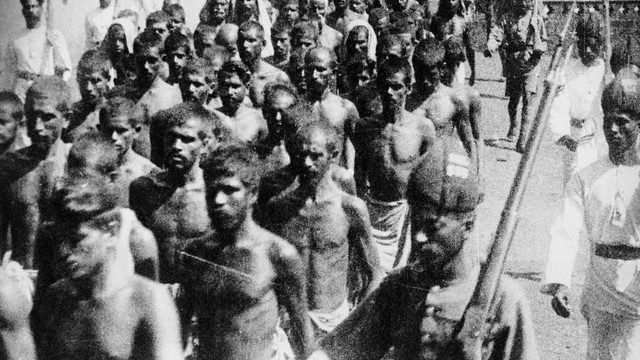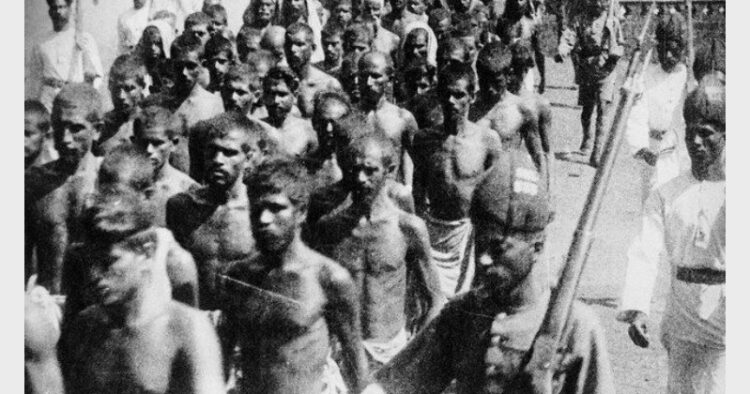The recollection of the true past is important to deliver justice to the victims of the Malabar Hindu Genocide

Amidst the pandemic, the Islamist-Maoist cabal in Kerala is accelerating its communal polarisation by resurrecting the symbol of Islamic brutality in Malabar – Variyan Kunnath Kunjahammed. It all started in the public sphere with the announcement of a movie by the Islamist -Communist director Aashiq Abu with Prithviraj in the title role. The former is known for his shady role in the Kerala Flood Relief Fund Drive. September saw the meek self-goal by the same cabal in suggesting that Variyan Kunnath Kunjahammed has been listed as a freedom fighter in the Dictionary of Martyrs: India’s Freedom Struggle 1857-1947, Vol 5. Since Prime Minister Narendra Modi had released it in March 2019, it is being construed as a sacrosanct document that lends legitimacy to Kunjahammed Haji.
The over-enthusiastic projection of Kunjahammed Haji in the Martyr’s list has once again exposed the naked perversion of history and politics of whitewashing for vote bank politics. The project for compiling the Martyr’s list was commissioned in 2007 by the UPA government to commemorate the 150 years of the Revolt of 1857. Undoubtedly, the Islamist-Communist propagandists hijacked it. This wrong is now being rectified by a three-member committee of the Indian Council for Historical Research.
In June 2020, The Hindu newspaper had republished an English translation of a letter apparently written by Kunjahammed Haji wherein he vehemently denies that Hindus were forcibly converted by his people. Rather he blames the British government agents of doing it! It seems, the reason for The Hindu to re-print the so-called letter has to do with the role of its earlier editor, S. Kasturiranga Iyer. He had convened the fifth Malabar district political conference in April 1920 at Manjeri, Malabar. Kunjahammed Haji was part of that meeting and in the next year, we had the Hindu genocide in Malabar! We all know the misadventure of the Congress, Gandhi, and Ali brothers in forging and leveraging Khilafat politics, lesser said the better.
Erasures and Silences of History
Kunjahammed Haji had declared himself as the Khilafat King (Caliph) of Eranadu. In 1921, there was widespread destruction of temples, forceful conversion of Hindus, along with rape, kidnap, and murder of Hindu women. The heartbreaking letter of the Rani of Nilambur to Lady Reading, wife of then Viceroy, narrates the horrendous lives of Hindu women during the 1921 jihad. A part of the letter runs like this – “But it is possible that your Ladyship is not fully appraised of all the horrors and atrocities perpetrated by the fiendish rebels; of the many wells and tanks filled up with the mutilated, but often only half-dead bodies of our nearest and dearest ones who refused to abandon the faith of our fathers; of pregnant women cut to pieces and left on the roadsides and in the jungles, with the unborn babe protruding from the mangled corpse; of our innocent and helpless children torn from our arms and done to death before our eyes and of our husbands and fathers tortured, flayed and burnt alive; of our hapless sisters forcibly carried away from the midst of kith and kin and subjected to every shame and outrage which the vile and brutal imagination of these inhuman hell-hounds could conceive of; of thousands of our homesteads reduced to cinder-mounds out of sheer savagery and a wanton spirit of destruction; of our places of worship desecrated and destroyed and of the images of the deity shamefully insulted by putting the entrails of slaughtered cows where flower garlands used to lie, or else smashed to pieces; of the wholesale looting of hard-earned wealth of generations reducing many who were formerly rich and prosperous to publicly beg for a piece or two in the streets of Calicut, to buy salt or chilly or betel-leaf—rice being mercifully provided by the various relief agencies.”
The unspeakable and inhumane violence and fury unfurled during the 1921 genocide is typical of the Malabari Islamic culture
The unspeakable and inhumane violence and fury unfurled during the 1921 genocide is typical of the Malabari Islamic culture. It is different from the North India Islamic culture, which is Persian centred with Central Asian roots. Islam in Malabar is Arabic in nature and was part of the mercantile Islam that got established around major trading points and ports in the Indian Ocean Region. Some scholars call it the Monsoon Islam. This historical division among Indian Muslims is important in understanding their present, especially their disposition towards the nation. One thread that can be disentangled is the historical roots of the affinity and loyalty of the Kerala Muslims with West Asian Islamic politics, especially their latest addiction – the ISIS. The Arabic nature of Malabar Islam with mercantilism at its core made them develop religious suicide rituals and fanaticism to protect their trade interest. In Malabar, religion infused suicidal attacks started with their competition with the Portuguese to dominate the spice trade. The same pattern can be seen in Indonesia and the Philippines, where Islam was forged by the Arabs.
Malabar was and is a unique Islamic frontier with a high-level religiosity bordering on an exceptional level of fanatic behaviour. Nilambur Rani’s letter has to be read against the above-mentioned background to understand the true intentions of Islamists like Kunjahammed Haji. He was not working for the liberation of Malabar from the British; rather, he was continuing a centuries-old trade war along as a religious war to convert the coast of Malabar into an Islamic state. The transnational voyages of the Muslims from Malabar for Haj and other religious undertakings introduced them to the theology and politics of West Asia; hence, they were only furthering a global jihadi politics in British Malabar.
Distress migration of the Hindu weaving community chaliyan or saliya from inner Malabar regions to Calicut town due to Islamic atrocities is another testimony. There are thousands of such incidents, but we don’t want to recognize it, we don’t want to talk about it. Why?
Truth & Reconciliation
CPI MP from Kerala, Binoy Viswam wants to raise the ICHR withdrawal of the Dictionary of Martyrs in the Monsoon session of the Parliament. We welcome the discussion. But are you ready to face the truth about Kunjahammed Hajiand his jihad? In this context, we need to ask the question—who is afraid of the real history of 1921 Malabar? The answer is obvious, the pseudo-secular religious fanatics and anti-religious communists. Their domination in history writing through deceit and deception has been called out multiple times, and as a result, their hegemony has ended. Hopefully, they have learned their lesson. However, our project to rectify the historical wrongs and erasures are not a call to humiliate and victimize the perpetrators of intellectual dishonesty. Rather it is our first step towards truth and reconciliation.
Truth about the violent past, especially horrendous incidents like the Hindu Genocide, should be publically discussed and debated in all its dimensions. By doing so, we can identify events, processes, and structures that may repeat such incidents in the future. The memory of the tragedy, the memory of its making, and the memory of its actors will act as a powerful reminder and a deterrent for the future. The recollection of the true past is important to deliver justice, in our context, the non-Muslims of Malabar.
Unfortunately, in India, the so-called pontiffs of secularism, the left-liberal historians argue that if we recover the violent past of the minorities, they will be subjected to humiliation and isolation in contemporary society. This is an illogical and perverse argument. It is also because there is no vocabulary of compassion and forgiveness in the left-liberal universe, so they are incapable of understanding the value of truth and reconciliation. Moreover, we should learn how Germany has been dealing with the Holocaust. They have bravely confronted their violent past, unpacked its constitution and motions in the school curriculum. This was done so that the future generations will be hesitant to roll down the path of fascism that the earlier generations undertook. No wonder, it is said that of all the virtues the most important one is strength, until and unless we as a society dare to tell the truth of the past and the present, our future will be tense and perverse.













Comments